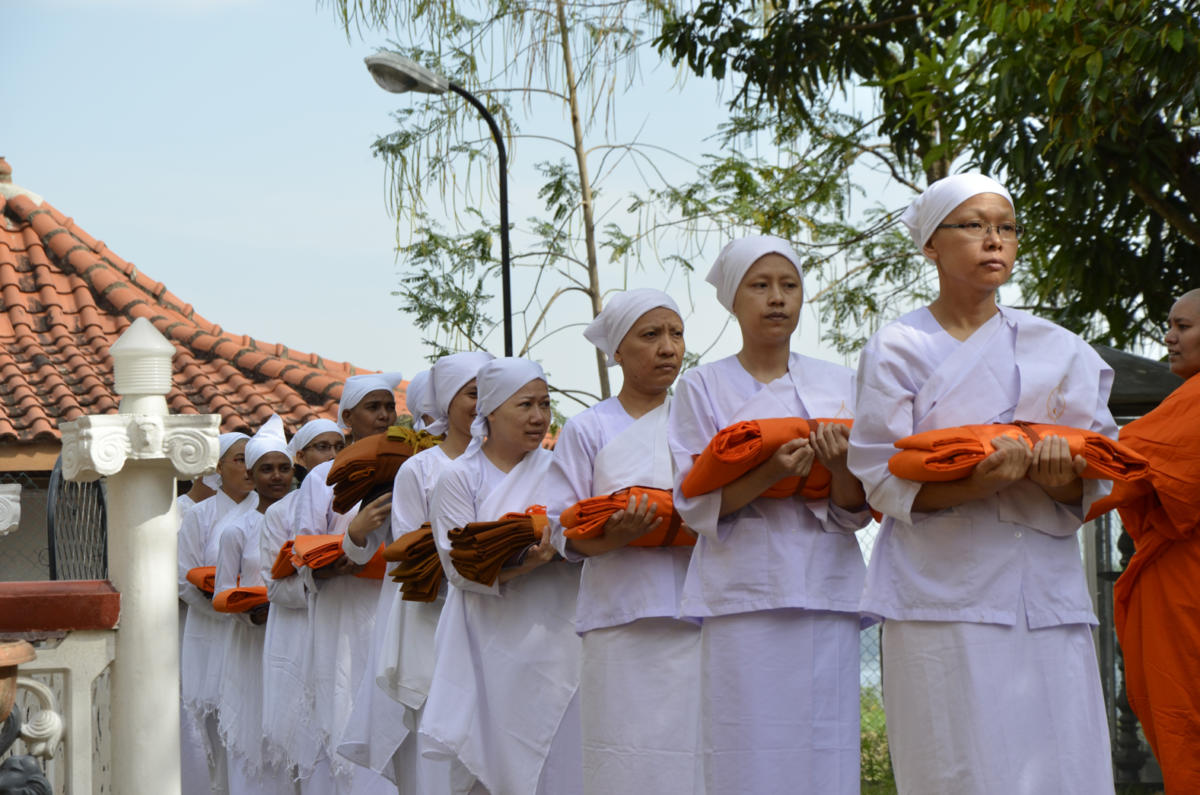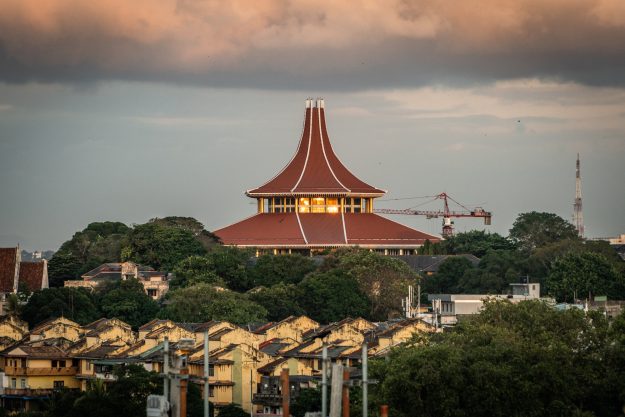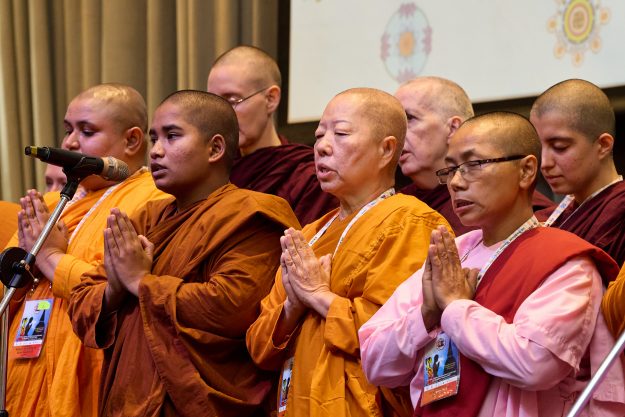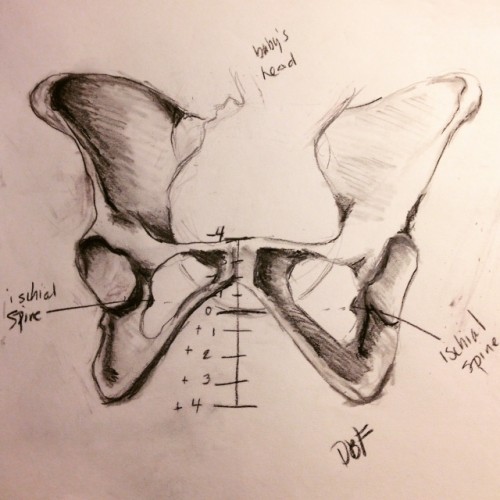Judging Bhikkhunis
A landmark case for Buddhism and law in Sri Lanka The post Judging Bhikkhunis appeared first on Tricycle: The Buddhist Review.

From its earliest moments, Buddhism has existed in a relationship with state law. There is even an old metaphor that purports to describe the proper balance between the two. In a perfect world, the metaphor goes, the Buddha’s dharma and the laws of the sovereign operate like two wheels of a cart. Each wheel rolls in parallel, one supporting the other while never getting in the way.
It’s an enticing image but a poor portrait of reality. For those of us who study Buddhism as a historical tradition, it’s clear that dharma and state law function more like ball bearings than axle wheels. Rather than treading their own path, the two grind together in a noisy and pressured way.
If you listen closely to recent debates about the ordination of monastic women, or bhikkhunis, in South and Southeast Asia, you can hear this grinding in real time.
South Asia is home to sizable communities of bhikkhunis. Thailand has nearly 300 bhikkhunis, resident in forty of its seventy-seven provinces and divided among nine major congregations. Sri Lanka has more than 3,000 living across dozens of monasteries, linked together by an All-Island Bhikkhuni Congress. In both countries, bhikkhunis have developed a reputation for piety, attracting considerable numbers of supporters.
The lack of legal recognition for bhikkhunis has significant consequences for their lives.
And yet bhikkhunis in South Asia have lived in the shadow of law. Governments in the region, following the precedent set by influential monks, have regarded the Theravada bhikkhuni order as illegitimate and, therefore, ineligible for legal recognition. While political and monastic elites acknowledge a thriving bhikkhuni lineage in ancient times, they insist that the Theravada branch of that lineage dissolved around the 11th century, when scholars believe it disappeared from Sri Lanka following a period of warfare and strife. They treat recent efforts to revive the bhikkhuni lineage, supported by a mixture of Mahayana and Theravada monastics, as invalid according to the standards of vinaya monastic law and thus unsuitable for recognition by governments that are constitutionally obligated to safeguard the Theravada tradition.
The lack of legal recognition for bhikkhunis has significant consequences for their lives. It means that bhikkhunis cannot register their titles, property, or organizations in the same manner as other clerics. Nor do they enjoy the full range of perquisites or protections—stipends, awards, public funding—given to bhikkhus and other religious leaders.
That is, until recently.
The Facts of the Matter
On June 16, the Sri Lankan Supreme Court issued a landmark decision that has the potential to change the legal status of bhikkhunis in Sri Lanka in dramatic and far-reaching ways.
In 2013, a bhikkhuni named Ven. Welimada Dhammadinna visited the Department of Registration of Persons, requesting an ID card bearing the title “bhikkhuni”—something she had seen several other bhikkhunis obtain in the past. Aware of the government’s policy towards bhikkhunis, the officer refused, advising Dhammadinna that the only religious title she could have on her ID was “sil mata,” or precept mother.
 The Supreme Court of Sri Lanka at sunset. | Image via Nazly Ahmed / Flickr.
The Supreme Court of Sri Lanka at sunset. | Image via Nazly Ahmed / Flickr.Precept mother is the Sri Lankan term for a category of Buddhist nuns seen across Southeast Asia. Going by names such as mae chii in Thailand or thilashin in Myanmar, these are Buddhist renunciant women who wear robes and shave their heads but do not undergo the higher ordination rituals associated with bhikkhuni orders. Formally, precept mothers accept ten precepts, rather than the 311 rules traditionally designated for Theravada bhikkhunis. In practice, however, they observe many more and tend to be known for their discipline and austerity.
Unlike bhikkhunis, precept mothers do have a formal legal status in Sri Lanka. Precept mothers can register property, apply for government funding, and, as the officer pointed out, use their religious title on IDs.
But Dhammadinna was not a precept mother. And so, having been denied her requested ID, she filed a fundamental rights petition with the Supreme Court, accusing the department of violating her constitutional right to equality under the law. She was joined in her petition by Ven. Inamaluwe Sri Sumangala, the head of the Dambulla fraternity (to which Dhammadinna is affiliated) and a key figure in the growth of bhikkhuni ordinations in Sri Lanka. It was Sumangala, in fact, who helped organize the 1998 ceremonies that saw the first bhikkhuni ordinations held on the island in nearly a millennium.
Landmark Judgment
The story of Dhammadinna and Sumangala’s petition may mark a turning point in Sri Lanka. While it’s not unusual for the country’s courts to hear cases involving Buddhism and Buddhist monastics, historically there has been a tendency for the higher judiciary to hesitate in ruling on especially controversial matters. In most instances, sensitive cases that have been under review—deferred and delayed—for as long as Dhammadinna’s do not resurface suddenly in the form of landmark public decisions. It was my prediction, up until June, that this would be the fate of Dhammadinna and Sumangala’s petition: It would remain in limbo for years and, when it did come up, would be resolved quietly and in a way that aligned with the prevailing orthodoxy.
And yet, last June, in a two-to-one majority opinion, the Supreme Court issued its milestone decision. Justice Amarasekara and Chief Justice Fernando announced that a government official’s refusal to grant Dhammadinna an ID card with the designation “bhikkhuni” did indeed violate her constitutional right to equality under the law. More than that, it effectively discriminated against her on the grounds of gender: “It is obvious that if the petitioner were a male,” the majority wrote, “he would not have faced these difficulties.”
But the opinion went well beyond the topics of gender and identity cards. In a long and wide-ranging analysis, it also affirmed the “de facto existence” of Sri Lanka’s bhikkhuni community, explicitly accepting that the bhikkhuni order had, in fact, been revived through the ordination rites conducted in the country since 1998. These ordinations, the opinion clarified, were themselves acts of collective religious practice and therefore eligible for protection under constitutional rights to freedom of religion. And, the majority pointed out, senior prelates from the island’s three main fraternities, who have long served as the chief spokesmen for Buddhism on the island, did not have the authority to stop them from taking place.
Legal Implications
It’s hard to overstate the radical nature of these findings in the context of Buddhism and law in Sri Lanka. Implementing it means more than just issuing bhikkhuni ID cards. It means counting bhikkhunis in the official registers of monastics maintained by the Department of Buddhist Affairs, creating legal instruments that enable them to incorporate societies and register property, and possibly including them in the Buddhist Temporalities Ordinance, the main statute governing the use and control of Buddhist places of worship.
It’s hard to overstate the radical nature of these findings in the context of Buddhism and law in Sri Lanka.
It may also mean reimagining the terms of Sri Lanka’s constitutional protections for Buddhism. Since 1972, Sri Lanka has included in its constitution a special chapter obliging the government to “give the foremost place to Buddhism” and to “protect and foster the Buddha Sasana [teaching].” To date, Sri Lanka’s judiciary has tended to interpret these clauses in a relatively conservative manner, mostly aligning its interpretations with the opinions of the island’s senior-most monks. Where monastic litigants have appealed to the court to challenge those opinions—for example, in seeking an order permitting the issuing of driver’s licenses to monks—they have mostly lost.
If fully observed, this decision charts a new relationship between the government and the monastic community. Rather than presuming a centralized, hierarchical monastic order, in which the chief prelates of the island’s three major fraternities exercise authority over the various subchapters that come “under” them, the court has indicated that protecting the sangha and the sasana means protecting Buddhist clerics and practices as they are, rather than as senior monks say they should be.
Such a finding challenges and may put a new kind of impetus on the island’s major fraternities. It may encourage new actions on their part to strengthen their internal constitutions and legal systems, thereby further clarifying lines of authority between senior leaders and local temples. Front of mind will no doubt be a comment made by the court that the island’s chief prelates had not taken sufficiently obvious “disciplinary measures” to prevent the bhikkhuni ordinations themselves. “This nonaction,” the majority opined, was itself proof that the Dambulla chapter and its community of bhikkhunis in fact exercised “some independence over [their own] affairs.”
The implications of the judgment could even radiate beyond Buddhist communities. One could easily imagine the majority opinion encouraging new kinds of legal action among the island’s other religious groups. After all, if the courts can issue judgments touching on gender discrimination in the sangha, can they also do so in the case of Christian, Hindu, or Muslim clerics?
Reactions
At present, it is unclear what practical effects the decision will have on religious life in Sri Lanka. However, one thing is for sure: It will enable bhikkhunis to receive their titles on ID cards, which is important for things like taking government exams and registering with public offices (not to mention the more general sense of dignity that comes from legal recognition). Whether the court’s actions will shift the balance of Buddhism and law in the ways described above remains to be seen.
 Monastics at the 19th Sakyadhita International Conference on Buddhist Women. | Image by Olivier Adam.
Monastics at the 19th Sakyadhita International Conference on Buddhist Women. | Image by Olivier Adam.Regardless of the practical impact, the case has generated no shortage of responses both locally and internationally. Within hours of the decision being released, Sri Lanka’s online message boards and Facebook were bristling with commentary, much of it positive. International Buddhist organizations also took note. Shortly after the court issued its opinions, the International Network of Engaged Buddhists, which has long advocated for gender equality in Buddhism, issued its own official statement of congratulations. News of the decision was also celebrated at the 19th International Conference on Buddhist Women, organized by Sakyadhita, the organization perhaps most responsible for the global revival of bhikkhuni ordinations, and which—in a coincidental turn of events—commenced its weeklong conference on the same day the decision was issued.
Yet not everyone has been happy.
Some have objected on legal grounds. In his dissenting judgment, Justice Samayawardhena admonished that, by pronouncing on the validity of the bhikkhuni order, the court had waded into “ecclesiastical matters” that should be the purview of monastic elites only. “The question of whether bhikkhunis should be recognized in Buddhist Law,” he warned, “is not a matter for this Court to decide.”
Others see the decision as a potential threat to Sri Lankan Buddhism itself. In a Sinhala-language submission, which was quoted at length in Samayawardhena’s dissent, the three chief monks of the island’s largest monastic fraternities cautioned that the revival of the bhikkhuni order could lead to a decline in Sri Lanka’s “pure Theravada Buddhism” and that any state intervention in the issue had the potential to stoke conflict among the island’s Buddhists.
Regardless of these reactions, both positive and negative, it’s safe to assume that things will not be the same for the island’s bhikkhunis. Sri Lanka’s grinding gears of Buddhism and law have indelibly changed the conditions of life in ways that include—but may not be limited to—bhikkhunis’ ability to register their titles with government offices.
Whether these wheels are just beginning to turn or have come to a new resting place is indeed the question of the day. Are there more changes on the way for religion and law in Sri Lanka? Will this decision catalyze analogous legal actions in other parts of South Asia? We will just have to wait and see.

 Konoly
Konoly 





























.jpg&h=630&w=1200&q=100&v=90ed771b68&c=1)
_1.jpg)